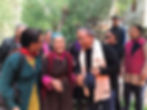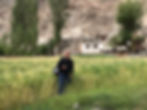
Himalayan Cultural Heritage Foundation (HCHF) supported by Foundation for Traditional Tibetan Medicine, Ede, The Netherlands has initiated a programme to educate villagers through awareness programme and discussions about the medicinal values of plants found in their respective region and to protect the endangered medicinal plant species found in the distinct agro-climate zones in the high altitude of the upper valleys of Ladakh. The programme is being carried out under the guidance of Amchi Lobsang Tsultrim, the director of Foundation for Traditional Tibetan Medicine and Prof. Geshe Konchok Wangdu, president, HCHF.
The project is is being coordinated by Dr Sonam Wangchok, founder, HCHF. Besides organizing awareness programmes HCHF has adopted a remotest village in Ladakh known as Rongdo in Nubra valley where villagers are being encouraged to cultivate medicinal plants like Manu, Rusta, Tig-Ta, Wang-lag and Pea flowers under the programme “Protection, Development and Education of Traditional Tibetan Medicinal Plants and the Unique Practice of Ladakhi Amchi System". The encouragement of families for cultivation of different types of medicinal plants ensures community participation in conserving herbal plants in Ladakh.






























Project for protection, development & education of traditional Tibetan medicine plants in Ladakh, India

The upper valley of Khardong village in Ladakh is known for medicinal plants. It is said that more than hundred different types of medicinal plants are found in this area. Today these rare and endangered plants are facing threats of destruction due to overexploitation by individuals with vested interests, which is a matter of grave concern. Adding to the problem is the impact of global climate change, overgrazing and loss of habitat. A local NGO, HCHF took up this issue with government authorities and initiated a project to address this problem by finding solutions through discussions involving villagers and other stakeholders towards reviving and strengthening protection of endangered medicinal plant species found in the distinct agro-climate zones in the high altitude of Kharzong village and Kharzong Phu (upper valley of Kharzong).
It becomes imperative to ensure a community-inclusive approach in such projects by making public a part of it. With the support of HCHF under the "Project for Protection, Development and Education of Traditional Tibetan Medicinal Plants and the unique practice of Ladakhi Amchi system" a family in Kharzong cultivated a medicinal plant called Rusta on a trial bases and it was successful. This has encouraged many other families to go for similar cultivation of different types of medicinal plants from next season. This way they are ensuring people's participation through this protection and conservation project by organizing awareness building and mobilizing of villagers of Kharzong towards reviving the traditional spirit of conserving rare herbal plants in Kharzong Phu.
Als u een donatie aan dit project wilt maken, dan kunt u het overmaken op ING gironummer NL23 INGB 0005 8329 92 ten name van P.T.T.G. te Ede.
Alvast hartelijke dank voor uw vriendelijke bijdrage !

Amchis, the traditional doctors of the region, who follow Tibetan system of medicine, are the key repositories of knowledge related to medicinal plants and their uses, Unfortunately, there are not so many senior Amchis left who have a rich knowledge of medicinal plant identification, detoxification, compounding the herbs and traditional pharmacy. There is a need to reach out to this unclaimed and extremely experienced Amchis to hold the treasure of this traditional healing knowledge.
Project team: This project is collaboration of Himalayan Cultural Heritage Foundation, Leh Ladakh and Foundation for Traditional Tibetan Medicine, Ede, The Netherlands.
In 2009, when amchi Lobsang Tsultrim and Mr. Wim Kurvers visited Spituk monastery, they found many young student monks having infectious skin problem. There are also senior monks and local people who can not visit to the local doctors or hospitals due to their age and lack of facilities. To keep the good health of the monks, nuns and local people in Ladakh, amchi Lobsang Tsultrim and Mr. Wim Kurvers started a health care project. In 2010 and 2011, amchi Lobsang Tsultrim visited Spituk monastery, he saw the monastery has a special room for first aid and there are some regular health check up for the monks and students.




Documentation of traditional Amchi knowledge in the Himalayas
Health care project Spituk Monastery Leh, Ladakh





